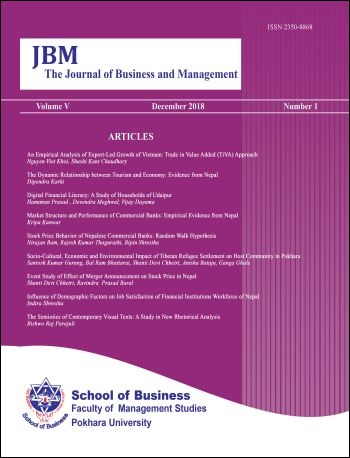Socio-Cultural, Economic and Environmental Impact of Tibetan Refugee Settlement on Host Community in Pokhara
DOI:
https://doi.org/10.3126/jbm.v5i0.27388Keywords:
Environmental Impact, Tibetan refugees, Socio-cultural, EconomicAbstract
The study attempts to empirically investigate and assess the socio-cultural, economic and environmental impact of the refugee settlements on the local host community who are living around the Tashi Pakhiel Tibetan camp located in Hemja, Kaski district. A questionnaire survey was undertaken to collect opinion of 500 host community members on the issue. The findings reveal that there exists social harmony, mutual co-existence, and bonding between the Tibetan refugees and local residents of Hemja. The two communities involve in social exchange and participate in social events of each other. The social acceptance is revealed from the fact that the practice of intermarriages between the communities is also prevalent. The Tibetan refugee camp is found not to adversely impact the host community culture. Similarly, the refugee settlement has not brought any adverse effect on the local environment. The basic services and facilities like education and health is available on equitable basis to both the communities. Finally, the economic interaction between the communities has resulted in mutually beneficial economic condition for both in terms of increased business and employment opportunities. Moreover, the economic benefits to the host community are found to be relatively higher as compared to the benefits received by the refugees.
Downloads
Downloads
Published
How to Cite
Issue
Section
License
Copyright © the School of Business. All rights reserved. No part of this volume may be reproduced or utilized in any form or by any means, electronic or mechanical, including photocopying, recording, or by and information storage and retrieval system, without permission in writing from the publisher.




